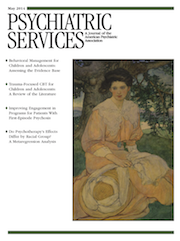Statutory Definitions of Mental Illness for Involuntary Hospitalization as Related to Substance Use Disorders
Abstract
Objective
In New York City, individuals gravely disabled by substance use disorders repeatedly present to emergency rooms yet rarely remain in treatment for more than several days and often sign out against medical advice. Although these individuals are at high risk of death and often lack the capacity to make treatment decisions, the laws in New York State are unclear about whether substance use disorders qualify as mental illnesses for the purpose of involuntary hospitalization. To better understand the national landscape of civil commitment law, with a specific focus on substance use disorders, a review was conducted of mental health statutes in all 50 states and the District of Columbia (D.C.).
Methods
Two independent reviewers examined all state mental health statutes using LexisNexis and Westlaw search engines.
Results
A total of 22 states, including D.C., do not reference substance use disorders in their statutory definitions of mental illness. Of the 29 that do, eight include substance use disorders and 21 explicitly exclude them. In addition, nine states have separate inpatient commitment laws specifically addressing substance use disorders.
Conclusions
Civil commitment statutes vary greatly by state in terms of clarity and specificity regarding which mental illnesses are included for the purpose of involuntary hospitalization. Mental health professionals and policy makers should discuss whether individuals gravely disabled by substance use disorders, a complex and vulnerable population, should be more widely included under standard civil commitment law.



